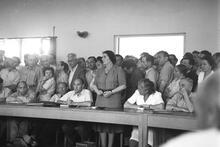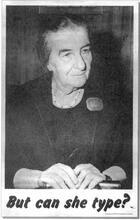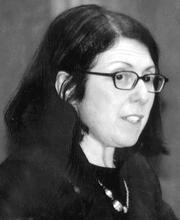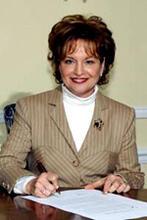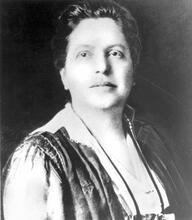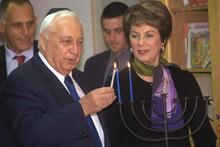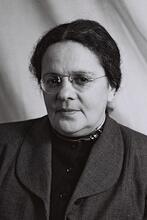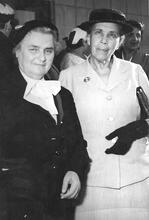Rita Eleanor Hauser
One of the first women to graduate from Harvard Law School during the 1950s, Rita Eleanor Hauser's career has taken her from presidential campaigns to the United Nations and back to law once again. Along the way, she worked towards achieving peace in the Middle East, established the Hauser Foundation, and donated $13 million to her alma mater, the largest contribution ever to a law school.
Institution: Private collection
Rita E. Hauser’s dual background in politics and international law led to her key role in persuading Yasser Arafat and the Palestine Liberation Organization to recognize Israel and renounce terrorism. Hauser served as a speechwriter and campaign strategist for Richard Nixon’s first presidential campaign in 1960. From 1969 to 1972 she was the United States representative to the UN Commission on Human Rights. In 1972 she joined the law firm Stroock, Stroock and Lavan, where she mentored other women and increased the number of women partners in the firm. From 1984 to 1991 she headed the American branch of the International Center for Peace in the Middle East. She served on the President’s Foreign Intelligence Advisory Board from 2001 to 2004 and was reappointed in 2009.
Background
Rita E. Hauser is a woman of many accomplishments. She was a trailblazer for women in law, politics, and foreign affairs at a time when few women entered the legal profession or achieved top-level positions in business and politics. She was instrumental in persuading Yasser Arafat and the Palestine Liberation Organization to renounce terrorism publicly and to recognize Israel. She was involved in Republican presidential politics beginning with Richard Nixon’s presidential campaign, and she was invited to join a major Wall Street law firm as its first woman partner.
Born in New York City on July 12, 1934, to Nathan and Frieda (Litt) Abrams, Rita Eleanor (Abrams) Hauser was the elder of two daughters. She received her BA from Hunter College (1954). After college, she won a Fulbright scholarship for graduate work in France. She attended the University of Strasbourg and was awarded a doctorate in political economy. At a time when women represented only one percent of those graduating from law school, she attended Harvard Law School (1955–1956), received her LL.B. from New York University Law School (1959), and became one of the few Americans to obtain a License en droit [French LL.B.] from the University of Paris (1958). She was licensed to practice law in New York and the District of Columbia.
Career
Hauser’s first job as an attorney took her to Washington, D.C., to serve as counsel in the Justice Department’s Appellate Tax Division under the Attorney General’s Honors Program. While in Washington, she was invited to join Richard Nixon’s first presidential campaign and distinguished herself as a speechwriter and campaign strategist. Raised in a Republican family, Hauser subscribed to the party’s approach in governance. After Nixon lost the 1960 election to John F. Kennedy, she moved to New York and worked in the international law department of a New York law firm while continuing her association with Republican politics.
In Nixon’s successful 1968 presidential campaign, Hauser served as cochair of New Yorkers for Nixon. She was next appointed the United States representative to the United Nations Commission on Human Rights, a position she held from 1969 to 1972. In addition, she served as a member of the United States delegation to the twenty-fourth UN General Assembly. It was during her tenure at the UN that she met the key players in Middle East politics and became committed to her pursuit of conflict resolution in the Middle East, human rights, and humanitarian law. During her term at the UN, she helped Jewish immigrants leave Russia and visited Palestinian refugee camps throughout the Middle East.
Hauser identified Golda Meir, whom she met during her tenure at the UN, as her mentor and role model. Meir inspired Hauser’s involvement in Middle East politics and encouraged her, a secular Jew, to learn more about Jewish history and her own Jewishness.
In 1972 Hauser was invited to join a major Wall Street law firm, Stroock, Stroock and Lavan, as a senior partner and the firm’s first female partner. In that capacity, she was instrumental in developing its international law department, became mentor to a number of its female associates, and advocated an increase in the number of women partners in the firm.
Throughout her career Hauser has served the United States in numerous high-level public service assignments. Of particular note, in her capacity as head of the American branch of the International Center for Peace in the Middle East (1984–1991), she participated in secret diplomatic negotiations, coordinated by the Swedish foreign minister, which culminated in Yasser Arafat’s 1988 public recognition of the State of Israel and the Palestine Liberation Organization’s renunciation of terrorism. As chair of the International Peace Academy, Hauser was invited by the head of the Palestine Elections Commission to be an official observer of the 1996 Palestinian elections.
Philanthropy and Awards
In 1988 Rita Hauser and her husband, Gustave M. Hauser, created the Hauser Foundation, a private philanthropic organization, to “meet the challenge of bringing about the peaceful resolution of conflict and promoting democracy”—particularly in the Middle East. In 1996 the Hausers donated thirteen million dollars to Harvard Law School, the largest gift ever donated to a law school, to fund the building of Hauser Hall. They also founded Harvard’s Hauser Center for Nonprofit Organizations in 1997. Previously, they gave five million dollars to New York University Law School to establish the Global Law School Program, which supports the Hauser Scholar Program for postgraduate foreign students and advances the integration of foreign law into the law school curriculum. In 2001 they gave an additional five million dollars to the program, which was then renamed in their honor. In 1999 Hauser proposed the endowment of the Edward Said Chair of Middle Eastern Studies at Columbia University. She also helped fund the position, which was established in 2003. In 1992 Hauser left the full-time practice of law to manage the work of the Hauser Foundation, of which she became president.
Over the years Hauser has been the recipient of numerous awards and honors and currently serves on diverse boards of directors. In 2001 President George W. Bush appointed her to the President’s Foreign Intelligence Advisory Board and the President’s Intelligence Oversight Board; she served through 2004 and was appointed again by President Barack Obama in 2009, serving through 2012. Hauser credits the “enormous support” she has received from her husband, whom she married in 1957, in helping her to handle her overlapping careers as wife, mother, attorney, United States representative to the UN and world traveler. Gustave Hauser was an attorney, business executive, and pioneer of the modern cable television industry. He died at the age of 91 in August 2021. They had two children, Ana Patricia (b. 1962) and Glenvil (b. 1963).
Hauser, Rita. Curriculum vitae, and interview by author, December 20, 1995.
Waring, Nancy. “Gus and Rita Hauser’s Lifetime Legal Merger.” Harvard Law Bulletin (Summer 1995): 3–7.

![Hauser, Rita - still image [media] Hauser, Rita - still image [media]](/sites/default/files/styles/scale_width_300px/public/mediaobjects/Hauser-Rita.jpg?itok=V4_TwpAK)
